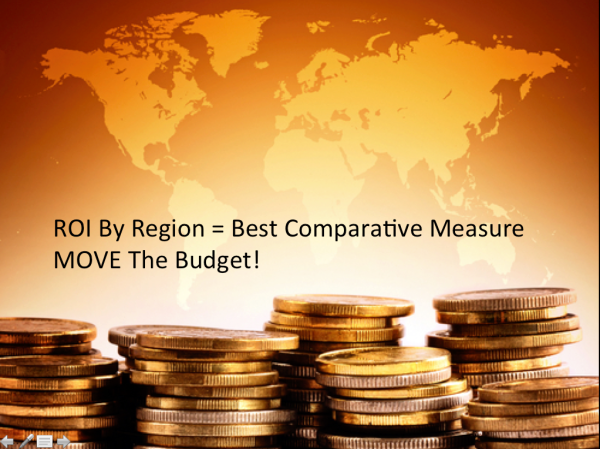Budget Flexibility: Accounting For Regional Differences In AdWords
Recently, I’ve been seeing a lot of odd spending patterns in client accounts, especially when it comes to international Google AdWords campaigns. No, I’m not referring to mobile or enhanced campaigns — I’m talking about to a failure to account for regional differences in how online consumers search and convert. How you approach the issue […]
Recently, I’ve been seeing a lot of odd spending patterns in client accounts, especially when it comes to international Google AdWords campaigns.
No, I’m not referring to mobile or enhanced campaigns — I’m talking about to a failure to account for regional differences in how online consumers search and convert.
How you approach the issue will depend upon a few different factors, but one thing holds true in all cases: when things don’t go according to plan, rigidity in the approach to budgets makes the situation much much worse.
Why AdWords Performance Deviates From Expectations
Problems often occur when businesses try to apply their existing AdWords strategy to multiple regions in different countries. I’ve come across many instances in which the campaign was set up to follow an approach used in the US, without too much research into local markets. If you don’t do extensive research, you really won’t know what the patterns mean.
I’m not necessarily suggesting that you go off and do that research right now. In fact, my advice with AdWords is to just go for it and go with the flow — just remember to expect patterns of behaviour which are considerably different to what you originally expected.
Yes, I know that Germany is the largest market in Europe (except for European Russia), and that it should be turning in larger results than the UK — in theory. In practice, however, it rarely works that way.
The two big factors impacting campaign variations across different regions are:
- Seasonality patterns
- Conversion preferences
Seasonality Patterns
Regarding seasonality patterns, the issue is that marketers have gotten so accustomed to thinking about the holiday season they’ve forgotten to account for it being different in other countries. After all, everyone does Christmas, right?
Technically, yes — Christmas is a common factor affecting the year-end season. But, the Dutch start early; the Germans celebrate slightly earlier than the US (and have a different idea about what constitutes a Christmas gift, in my experience); the Brits coincide with the US; the Spanish and Italians are a bit later; and the Russians bring in the Christmas tail a couple of weeks after everyone else. On top of that, Europeans don’t have a Thanksgiving Day in the mix.
The peak holiday season in the summer also varies significantly. You’ll not be surprised to learn that the Mediterranean countries (plus Austria) typically have longer holidays in the summer than the more northerly Europeans. The French disappear in August and even have a name for when everyone returns to work and school: la rentrée. On the other hand, Northern Europeans — the Dutch, for instance — tend to go on vacations in July and return in August.
Conversion Preferences
On conversion factors, if you’re measuring something like a CPA — which I call a “Cost Per Anglicization” — don’t forget that conversion rates naturally differ from country to country simply based on cultural and economic differences. A term that puts an American at one point in the funnel doesn’t necessarily put a French or British searcher at the same point in the funnel, and there is a relatively small likelihood that you’ll get them all in line across the board.
This discrepancy across regions can be due to issues with your site, of course — but you also have to allow for local shopping patterns, such “research and shop” as opposed to “buy online.”
So, there are many factors that can can cause your AdWords results to look weird. But, more worrying is the built-in campaign management quality factor. You’re dealing with campaigns created by humans who each have a different understanding of your messaging and value proposition, and sometimes have varied skill levels, too. I’m not necessarily saying this is a huge problem — it’s simply a fact of life you have to work with.
How To Manage Budgets To Account For Regional Differences
Budget rigidity leads to much poorer performance because of the issues mentioned above. If you have an AdWords budget set for the Netherlands and France, for instance, the holiday spend will vary across the summer, and you’ll have unspent budget in one at the same time that the other region is maxed out.

Moving Budgets Across Regions Increases ROI Source:Webcertain
In an ideal world, you would set an overall global budget with targets per region. You would then let your PPC specialist allocate spend across different regions as needed based on seasonality and conversion preferences, accepting that they might not achieve exactly your target levels. It’s okay for them to “go with the flow” — just so long as they don’t overspend and use up your entire global budget too soon.
I know this is often a difficult setup when different budget owners have a vested interest — but you can reassure them that over a year, the budget targets will be more or less met, or you’ll pick up the difference from the corporate budget, perhaps. I have seen many circumstances where this flexibility has enhanced performance by anything up to 20%.
Unfortunately, it’s more difficult to tell what you’re missing in a rigid situation because you already missed the opportunity. Go on, chill out, just let things go a little and you’ll be on a roll!
Opinions expressed in this article are those of the guest author and not necessarily Search Engine Land. Staff authors are listed here.
Related stories
New on Search Engine Land